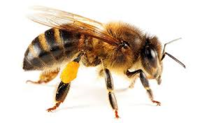BEES
There are many species of bee, however the four most commonly encountered are Honey, Bumble, Mining and Masonry.
Honey Bees are extremely beneficial to the environment and should be preserved whenever possible. If you have a swarm of bees on a bush or in a tree please call a beekeeper who may well be happy to collect your swarm from you.
For a list of local bee swarm collectors please click on either of the following links:
On very rare occasions bees can occupy voids within inhabited buildings where they may pose a serious threat to the safety of the home occupants. In these circumstances we recommend the first point of contact should be a beekeeper to establish if they are able to recover the bees. In the event that humane destruction is the only option available, this can be undertaken subject to the following stipulations. The point of entry of the bees to the building should be accessible and the treatment is undertaken in the full knowledge that there will be additional costs to ensure that all access points are sealed up following treatment. This is a legal obligation when treating feral honey bees to avoid future contamination of foraging bees by any insecticide used. This obligation will not be waived under any circumstances. We are unable to guarantee Honey Bee treatments.
Bumble Bees are larger than honey bees and easily recognised by their furry squat abdomen. They are not aggressive and will not sting unless provoked. In most circumstances they pose no risk at all to householders and left undisturbed will die out with the first frost. If a nest is located in a situation where they can pose a threat to the very young or elderly e.g. a school playground, we do offer a treatment service, however, if whenever possible, we would advise protecting the bumble bees by avoiding going close to the nest.
Masonry/Mortar Bees are solitary bees and have no workers or collective nest. They can sometimes be seen entering cracks in soft and decaying mortar to utilise the crack as a chamber in which to lay their eggs. They do not damage brickwork and mortar and only take advantage of existing decay. Masonry bees are not aggressive and do not sting. They are generally seen to be active from late April to mid June, and by July they eventually die off. They do not require treatment and we do not offer a treatment service for them. Re-pointing of mortar which is soft or decayed will be sufficient to deter them from using the mortar as breeding chambers.
They can be confused with wasps and we recommend that you check that the insects you are seeing on the brickwork are wasps before calling, as we have to charge for a treatment callout if the insects are in fact Masonry Bees.
Mining Bees are again solitary bees, which do not sting. They tend to create many holes in soft sandy soils in sun drenched areas, flying low to the ground in quite large numbers looking for their egg laying chambers. The holes in the soil are about the diameter of a pencil with soil around the rim. They can be deterred if this is required by watering the soil and lightly raking the surface, however, they are no threat to householders and as an unusual and beneficial insect in the garden we recommend they are left undisturbed. We do not offer a treatment service for Mining Bees.
They are very easily confused with wasps, and therefore if they are using many holes in the ground and not all flying into one then they are Mining Bees. A call to treat wasps which upon arrival proves to be Mining Bees will be chargeable.
We offer our specialist wasp nest control services covering all the major towns and villages within our region including Dorchester, Weymouth, Portland, Wareham, Bridport, Bradpole, West Bay, Beaminster, Sherborne, Chetnole, Stalbridge, Blandford Forum, Lyme Regis, Charmouth, Yeovil, Abbotsbury, Cerne Abbas, Charminster, Charlton Down, Chedington, Frampton, Shipton Gorge, Burton Bradstock, Maiden Newton, Wool, Lulworth, Winfrith, Evershot, Martinstown, Milborne St Andrew, Moreton, Owermoigne, Portesham, Puddletown, Tolpuddle, Dewlish, Winterbourne Abbas, Milton Abbas, Rampisham, Buckland Newton, Cattistock, Osmington, Yetminster and all surrounding areas.

